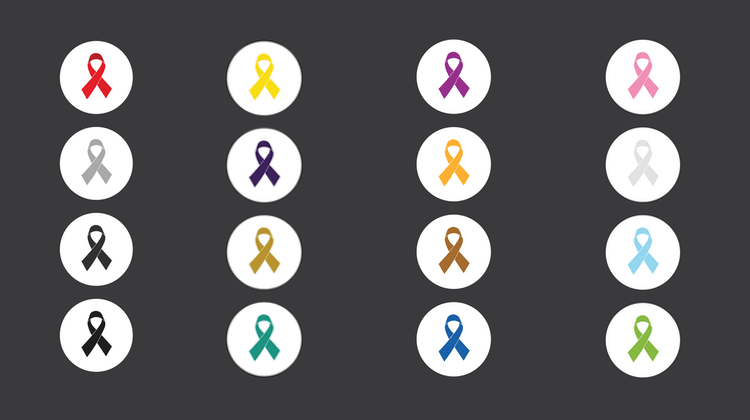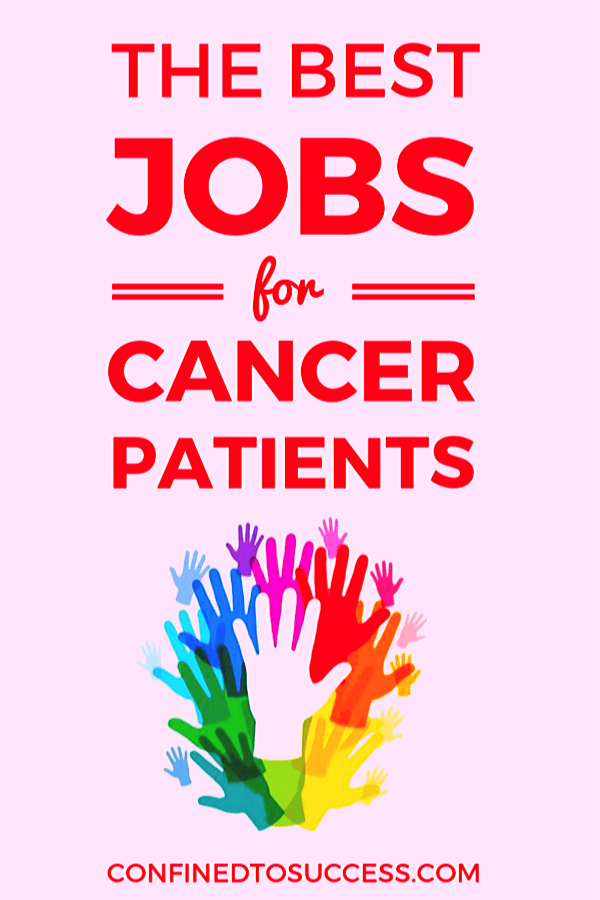Best (And Worst) Jobs For Cancer Patients

When you have cancer, a job can provide a sense of pride and purpose. It can also be a way of telling the world that you’re not defined by your condition. However, the job search can be challenging, and you may feel bewildered about where to begin. To point you in the right direction, here are some of the best jobs for cancer patients, as well as ones to pass up.
WORST WORK CONDITIONS FOR CANCER PATIENTS
It’s awful to be unsupported at a job, whether you’re healthy or not. So to start things off, here are some work conditions you’re better off avoiding:
An Employer Who Threatens to Fire You Because You Have Cancer
An employer who threatens to use this tactic violates the Americans with Disabilities Act. [source] This law protects employees from being fired because of their disability. It’s stressful to have intimidation hanging over your head, especially when you’re already dealing with a stressful illness. You may be too depleted to take action against your employer, as well.
Other forms of discrimination based solely on your illness may include:
- Not being considered for a promotion that was promised to you before you became sick
- Being demoted without justification
- Being overlooked for a new or higher position
- Pressuring you to take a position that you never would have taken before you got sick
An Employer Who Insists You Soldier On
An employer that forbids you from taking time off due to your illness violates the Family and Medical Leave Act. [source] The FMLA entitles you to take up to 12 weeks of unpaid, benefit-protected leave within 12 months. This is another situation where you may not feel well enough to deal with the stress of a lawsuit.
An Employer Who Doesn’t Provide Reasonable Accommodations
Reasonable accommodations are adjustments to the workplace and duties that help disabled employees perform their tasks. Accommodations are considered reasonable if they don’t place undue hardship on the employer. [source]
These accommodations could include granting flexible schedules or time off for medical appointments. An unethical employer will try to dodge the “system” to keep you on the clock. Not only is this kind of treatment nasty, but it’s also illegal.
Employees Who Are Afraid of You
Cancer is the most feared disease in the United States, and your coworkers may fear those afflicted with it. [source]
While they know it’s not contagious, you represent a very scary illness that could smite them. As a result, they avoid you because you’re too close for comfort. Being treated this way can be incredibly isolating and frames cancer as your sole identity.
BEST WORK CONDITIONS FOR CANCER PATIENTS
On the flip side, many employers are happy to make workplace concessions, enabling you to be as successful as possible:
An Employer Who Provides Reasonable Accommodations
This employer understands that reasonable accommodations aren’t unreasonable. Concessions are much more beneficial than withholding modifications and setting a cancer patient up for failure. An ethical employer is flexible because they don’t want to lose a valued employee.
Reasonable accommodations an employer can provide include:
- Allowing you to leave when you need to for doctor’s appointments
- Giving you time off to recover from treatment
- Modifying your work schedule
- Giving you regular breaks to take medication
- Relocating your workstation closer to the bathroom for easy access if you’re nauseated
An Employer Who Can Talk with You Honestly and Nonjudgmentally
This is an employer who may not know anybody else with cancer and strives to understand what it’s really like. They don’t make assumptions about what you feel or don’t feel or what you can and can’t do. They want a deeper understanding of your condition to determine how you can best serve the company and how it can best serve you.
A Boss Who Lets You Work From Home
Although you must still be conscientious when working from home (no breaks to watch reruns of Friends, please), you do have some leeway in how you work. You can take your medication on time and take breaks when you’re tired. You can take care of yourself if problems arise. You can also work at a comfortable pace instead of struggling to keep up with officemates.
A Boss and Officemates Who Are Sincere
When a cancer patient is hit with clichés such as “Everything’s okay,” “You’ll be fine” or “You’ll beat this,” they ring hollow and insincere. Instead of helping the patient feel more included, this treatment makes them feel like even more of an outsider.
A forward-thinking employer will teach their staff that they shouldn’t offer advice or feigned assurance. Instead, they should be friendly, welcoming, and ask genuine questions that show an interest in you, not your illness.
TIPS TO HELP CANCER PATIENTS GET THROUGH THE WORKDAY
During the workday, you can empower yourself and take charge of your health by following these tips:
- checkPlan your treatments – If you need to recover after treatments, you can plan them late in the day or on Fridays. This will interfere with work as little as possible while giving you time to rest and recuperate.
- checkFind a place for phone calls – You’ll likely have to make calls to your specialists and doctors regularly. Ask if your employer can provide you with a private place to do so. This way, you won’t feel self-conscious or feel like you’re putting your personal life on public display. It would also be helpful if your employer could provide you with a quiet room to rest.
- checkTake more breaks – Find out if you can take extra breaks to deal with your condition and the side effects of treatment. An officemate can be assigned to cover you so your work doesn’t lag.
- checkBe aware of unhelpful thought patterns – When going through a major life event like cancer, it can be easy to go down a rabbit hole of self-destructive thoughts. Besides the physical discomfort you’re experiencing, you compound your suffering with unhelpful thoughts. These include:
- All-or-nothing thinking – You see things as opposites with no gray area: black and white, perfect or failure, good or bad. For example, you’re having difficulty with an assignment and decide you’re no good at doing your job from now on.
- Labeling – You talk cruelly to yourself, calling yourself a loser, stupid or incompetent. You beat yourself up in a way you’d never treat others. For example, you decide you’re useless because you can’t fulfill your full work requirements.
- Mental filter – You take a single negative event and overlook all the positives of the situation. For example, all your officemates are supportive of you except one. Based on that one reaction, you assume no one likes you and completely discount all the others who do like you.
WORST JOBS FOR CANCER PATIENTS
When dealing with a serious illness, you don’t need your stress compounded by a physically and mentally draining job. These are jobs to avoid so you don’t get more depleted:
- Fitness instructor – If you’re going through cancer treatment, you may not be able to handle the exertion, endurance, and stamina required of a fitness instructor. Whether you’re leading classes or doing personal training, you must be able to perform at the same level or better than your students. This way, you present yourself as an authority figure. You won’t have much credibility if you keep running out of steam.
- Bartender – When you bartend, you’re “corralled” in a confined area for long periods and are unrelentingly in the public eye. You have to be animated, extremely sociable, and thick-skinned. Long breaks to deal with the effects of your treatment may not be possible, and brain fog may cause you to forget orders or confuse them. [source]
- Bank teller – This is another tough one. Again, you’re standing on your feet for long periods, not to mention under scrutiny by a revolving door of customers. If you’re already exhausted, these conditions could test your limits. Since you’re dealing with money – sometimes large quantities of it – brain fog could spell disaster.
- Public relations – This is a job where you’ll be hurtling along at warp speed. You’ll be writing a stream of press releases, bios, speeches, articles and ads, as well as working the phone, interacting with clients, arranging interviews and doing damage control, if necessary. The pace, alone, could be exhausting for a cancer patient.
BEST JOBS FOR CANCER PATIENTS
Don’t buy into the myth that jobs for cancer patients are hard to come by. There are many jobs where you can thrive and be respected and appreciated for your contribution:
- Freelance writer – If you choose, you can do this job completely from home. You can be a regular contributor for media, such as magazines (digital or print), blogs, and websites. You can also find an outlet where you can place one-off pieces. Any research necessary can be done via internet searches, emails, and phone calls. Yes, you can expect deadlines, but you’ll have the luxury of being able to take as many breaks as you need, whenever you need them. Check out my dedicated guide to freelance writing here.
- Tutor – This is a low-key job that has virtually no physical demands. You’ll sit one-on-one with a student who’s deficient in an area you’re knowledgeable about. These students could be children, teenagers, adults or seniors. You could teach someone how to read, help someone prepare for their SATs or help someone understand algebra. There are endless possibilities! You could even provide your services via Skype if you’d prefer.
- Transcriptionist – Transcription is a great freelance job if you want to work from home. Transcriptionists turn audio files (typically MP3s) into typed documents. You’ll need to type accurately at an efficient speed of 80 to 100 words per minute and have excellent spelling skills. It’s also important to be able to decipher accents, unclear speech, poor sound quality, and multiple voices.You can be a general transcriptionist and handle a broad range of audio, including interviews, lectures, meetings, podcasts, and more. If you’d rather get more specific, you can specialize in legal transcription, medical transcription, corporate transcription or foreign language transcription.
- Proofreader – While there are plenty of proofreading apps to choose from, the profession still requires the human touch. Proofreading can be done from the comfort of your home, with only a computer, extreme meticulousness, and exceptional spelling, grammar, and style skills.You’re the one who finds an “oar” when it should be “or,” a comma that should be a semicolon, and a “misspelling” that should be “misspelling.” Proofreaders check many types of documents, such as legal, technical, financial, medical, and business.
- Counselor – Who could counsel cancer patients as effectively as a cancer patient, themselves? You don’t merely say it’s hard. You personally know it’s hard. Clients will be able to relate to you on a deep, personal level. Counseling is very sedentary, but you can also conduct sessions via Skype or phone if you’re uncomfortable doing them in person.
- Survey taking – Survey taking is a great way to put money in your pocket without leaving home. Paid online surveys are market research tools that help companies better understand their consumers’ needs. You merely give your opinion about a product or service and get paid.If you’d like to increase your earnings, you can sign up with multiple survey sites. No special knowledge or experience is necessary.Each online survey has a different payout, with a few topping out at $50. Survey taking offers ease and flexibility – two things super important for cancer patients. For more information, check out my dedicated guide to survey-taking here.
- Affiliate marketing – Affiliate marketing is an excellent work-from-home opportunity if you’re a cancer patient. It can be done whenever you want, at your own pace, and could eventually become a very reliable source of passive income. Eighty-one percent of brands rely on affiliate marketing, so it’s not going away anytime soon. [source]As an affiliate, you earn commissions by promoting another company’s products and services via website links on a blog. Each time someone clicks on the link and makes a purchase, you get a commission. Depending upon how you feel, you can do this for as many hours or days you want. It’s a business model that’s paid off for me and can surely pay off for you, too.
NOW IT’S YOUR TURN!
What jobs for cancer patients would you recommend? How have you dealt with cancer in the workplace in the past? Leave your comments below!







